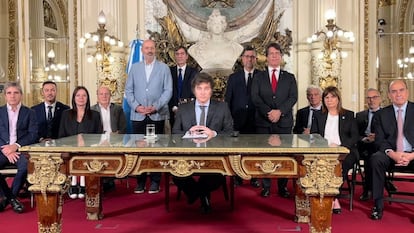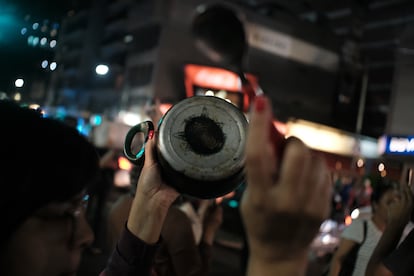Milei begins dismantling the Argentine State by imposing 300 reforms in a single decree
The far-right president repeals laws before going through Congress, eliminates dozens of state controls and enables the privatization of companies


Javier Milei has formally begun to dismantle the Argentine state. Surrounded by his ministers, the far-right president on Wednesday presented a decree that repeals laws, eliminates dozens of state regulations, enables the privatization of state companies such as the oil giant YPF, and opens the door to operations in dollars. The decree also kick-starts the process to make the labor market and the health system more flexible. The new regulations will be in force at least until the decree is reviewed by Congress, where the governing party is in the minority. To reject it, both chambers need to vote against it.
In a 15-minute speech that he read out, Milei listed 30 of the nearly 300 reforms contained in the document that will be published in the Official Gazette. These include the repeal of laws that forced companies to guarantee the internal supply of food and supermarkets to indicate the lowest prices of some basic products. It also eliminates industrial promotion regulations in disadvantaged areas, the rent law that established semiannual increases for tenants and legislation that prevented the privatization of public companies.

From now on, soccer clubs will be able to be public limited companies, foreigners will have no limits on the purchase of land, and transactions may be carried out in dollars without any impediment.
The health system will also undergo significant changes. Private insurance will be able to freely set prices from now on, while insurance linked to the unions (known as social insurance) will have a more flexible regulatory framework. In addition, electronic medical prescriptions will be used with the aim of streamlining procedures and reducing costs.
The decree opens the protected Argentine market to the world by eliminating many of the rules that hindered imports and exports. The Argentine industry, which has enjoyed little internal competition for years, will be one of the most intensely affected sectors, as happened in the past during the neoliberal decade of Carlos Menem (1989-1999).
Milei began his speech, broadcast on national radio and television in prime time, with a long diatribe against politicians — whom he called a “caste” that has been treated like gods — and against the left, which he again accused of causing millions of deaths around the world. The new president will also send to Congress a series of laws with changes that cannot be made by presidential decree. “The lawmakers will have to choose between being part of the change or obstructing the most ambitious reform process in the last 40 years so that Argentina can become a world power again,” he threatened. He will not wait until March, when the legislative year begins, but will call extraordinary sessions.
One of Milei’s battlehorses is the deregulation of the Argentine labor market, which has very beneficial rules for white-collar workers, 30% of the total. Several administrations tried and failed to reform labor legislation, but the new president wants to try again. The decree addresses aspects of the regulations that do not need to go through Congress, such as the increase in the trial period before new hires and alternative compensation mechanisms for the current ones.
Protests
Milei became president with the record support of 56% votes, and he is using that support to ask legislators to approve the change of course “that the people voted for.” But he is governing in a very polarized society and with powerful unions and organizations that are willing to stand up in the streets to any curtailment of their rights. The first demonstration took place on Wednesday afternoon, when more than 10,000 people took over the center of Buenos Aires amid a huge police deployment to protest against the large announced cut in public spending, of about $20 billion.
Hours later, after hearing the reading of the presidential decree, the protest was revived among the urban middle class. Outraged neighbors expressed their rejection by banging pots and pans from the balconies of Buenos Aires and other large cities in the country. Little by little, protesters gathered on the main avenues of every neighborhood and hundreds of them decided to march together to the doors of Congress, where many drivers honked their horns in a sign of support. These types of demonstrations became popular in 2001, when the worst economic and social crisis in Argentina’s recent history broke out.
The opposition harshly condemned a decree that seeks to transform Argentina into a liberal state overnight. One of the most critical voices was that of the Buenos Aires governor Axel Kicillof, a Peronist: “[Milei] proposes to privatize everything, deregulate everything, destroy workers’ rights, destroy entire sectors of production, raffle off soccer clubs and the heritage of Argentines. All this, without going through Congress, which could meet and discuss it. He just fell short of saying ‘Out with democracy!’” he said. The left is urging the unions to call a general strike.
Congress can reject Milei’s decree with a majority vote in each of the chambers. If only one of them approves it, or if one fails to vote on it, the decree remains valid. In the meantime, the new regulations are in force.
Sign up for our weekly newsletter to get more English-language news coverage from EL PAÍS USA Edition
Tu suscripción se está usando en otro dispositivo
¿Quieres añadir otro usuario a tu suscripción?
Si continúas leyendo en este dispositivo, no se podrá leer en el otro.
FlechaTu suscripción se está usando en otro dispositivo y solo puedes acceder a EL PAÍS desde un dispositivo a la vez.
Si quieres compartir tu cuenta, cambia tu suscripción a la modalidad Premium, así podrás añadir otro usuario. Cada uno accederá con su propia cuenta de email, lo que os permitirá personalizar vuestra experiencia en EL PAÍS.
¿Tienes una suscripción de empresa? Accede aquí para contratar más cuentas.
En el caso de no saber quién está usando tu cuenta, te recomendamos cambiar tu contraseña aquí.
Si decides continuar compartiendo tu cuenta, este mensaje se mostrará en tu dispositivo y en el de la otra persona que está usando tu cuenta de forma indefinida, afectando a tu experiencia de lectura. Puedes consultar aquí los términos y condiciones de la suscripción digital.








































